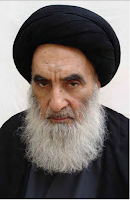His Eminence Grand AyatollahSayyid Ali Husseini Sistani
Marja of the Hawza, Najaf, Iraq
Grand Ayatollah Sayyid Ali Husseini Sistani is the prime marja, or spiritual reference for Ithna'Asharia (Twelver) Shi‘a Muslims. He is the leader of the Hawza Seminary in Najaf, Iraq and the preeminent Shi‘a cleric globally. Sistani is one of the most respected of the marjaiyya—the highest position of authority in the Usuli school of Twelver Shi‘a fiqh.
Preeminent Shi‘a Cleric and Marja Taqlid
Sistani's influence in the Twelver Shi‘a sect stems from his scholarly lineage and education, which has enabled him to reach the status of marja taqlid—the highest status in the Usuli branch of Twelver Shi‘a Islam. Marja taqlid means literally one who is worthy of being imitated— placing Sistani in a position of great authority over Twelver Shi‘a Muslims. There are currently only 29 marjas worldwide. Sistani is descended from a family of religious scholars, and was educated in the leading institutions in Iran. He later went to Najaf, Iraq to study under the Grand Ayatollah Abu al Qasim al Khoei. On Khoei's death in 1992 Sistani took over as grand ayatollah, inheriting al Khoei's following. He soon rose to become the leading cleric in Iraq. With the recent opening of Iraqi shrines to Iranian tourists Sistani is gaining a following outside of Iraq.
Financial Influence
Sistani also has very significant financial clout due to his position as marja. As a marja his followers give him a religious tax (khums, Arabic for one fifth). The redistribution of this tax for the common good is one of the key roles of a marja. Much of this remittance is redistributed through the Al Khoei Foundation—the largest Twelver Shi‘a development organization in the world that maintains a network of educational and humanitarian establishments for both Shi‘a and non-Shi‘a Muslims.
Quietist Influence
Significantly Sistani is against the idea of Velayat-e Faqih, suggesting Shi‘a clerics should not get involved in politics. Paradoxically this approach has afforded him very strong influence as a religious leader unsullied by politics. We can see this after the Iraq invasion when Sistani issued a legal ruling (fatwa) calling on the clergy to guide Iraq's populace, and later during the 2005 elections when he issued a ruling telling Shi‘a women that they were religiously obliged to vote. Ali Sistani has used his position of quietist authority to wield influence also as a peacemaker in the turbulent post-invasion Iraq. At a time when Sistani was losing support to Sheikh Muqtada al Sadr, he showed his sway by arranging a lasting deal between Sadr and US forces at the Imam Ali Shrine in Najaf in 2005—a deal that secured the Shrine and pushed for an American retreat.


No comments:
Post a Comment
give us your comments to develop our site